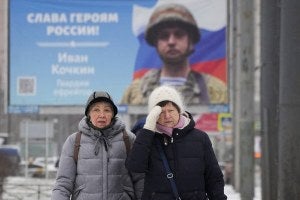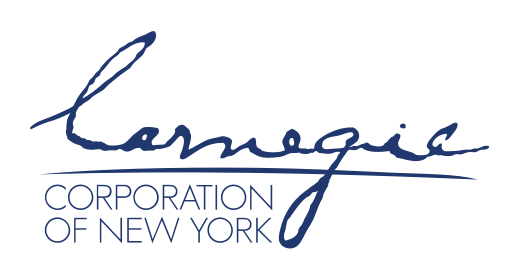But the public is more ready than ever to enter peace negotiations.
Despite suffering heavy military casualties, recruitment and equipment challenges in its conflict with Ukraine, Russia continues to make slow but significant gains on the battlefield. A just-completed Chicago Council on Global Affairs-Levada Center survey, fielded January 23-29, 2025, suggests the Russian public feels the wind at its back, as a majority of the population expects the Russian side to prevail in the conflict.
Russians also seem to credit the military operation in Ukraine with boosting their country’s international clout and political stature. For now, at least, they prioritize Russia’s projection of power and strength internationally over improving the country’s living standards. At the same time, perhaps to cement current battlefield gains, more now than ever before support starting peace negotiations.
Key Findings
- Majorities of Russians express pride in their country’s history (94%), political influence in the world (74%), and cultural, military, and economic achievements (88%, 82%, and 57%, respectively).
- For the first time, a majority of Russians say they would like to see Russia as a great power that is feared and respected by other countries (55%) rather than a country with a high standard of living (41%).
- As in past surveys, three in four support the continued military action in Ukraine (78%) and think Russia will emerge victorious (76%).
- Yet there are some indications that continued support for the conflict could be softening: the highest percentage yet (61%, up from 54% in 2024) believe it is time to start peace negotiations rather than continue military operations in Ukraine.
- Almost twice as many say Russia should start negotiations so it reduces costs to households (59%) as say it should continue the military operation (32%).
- More than twice as many say Russia should start negotiations to prevent additional deaths of Russian soldiers (65%) as say it should continue military operations (26%).
- More Russians distrust (50%) than trust (35%) reports from the Kremlin about exact civilian and military casualties resulting from the conflict.
Russian Pride in Country Highest in 30 Years of Polling
Public opinion surveys conducted in Russia over the last decade have tracked wartime spikes in public approval of Russian President Vladimir Putin and state institutions. During times of conflict, they also tend to express higher levels of nationalism, confidence, and pride in their country—and this particular moment is no different.
The most recent Council-Levada Center survey finds that Russians are prouder than ever of their country (96%, with 76% being very proud), history (94%, 68% very proud), and political influence in the world (74%, 34% very proud).1 They have also grown more proud of Russia’s economic achievements but to a lesser degree (57%, with 21% being very proud).
In new questions that were not asked in previous Levada Center polls, at least eight in 10 Russians also say they are proud of their country’s military achievements (82%, 49% very proud) and cultural contributions (88%, 58% very proud).
Public Believes Russia is Respected More Now than a Decade Ago
This increase in national pride coincides with the growing sense that Russia is more respected in the world today than it was 10 years ago (49%, 21% about the same, 25% less respected). Although Russians were more likely to say their country commanded greater respect in 2019, this level is still one of the highest recorded in Levada polling. Underpinning these sentiments is widespread approval for Putin (87% approve of his performance) and the overarching belief that the country is on the right track (71%, 17% wrong path) (see Appendix Figure 1 and Table 1).
Public Favors Power Projection over High Standard of Living
With the military conflict with Kyiv in the backdrop, the Russian public seems to have shifted its preference in the primary goal for their country. For the first time, a majority of Russians say that above all, they would like to see Russia as a great power that is feared and respected by other countries (55%) rather than a country with a high standard of living, even if it is not one of the most powerful countries in the world (41%).
For the last two decades, the majority of Russians preferred the opposite tradeoff (for Russia to be a country with a high standard of living, even if that meant it wasn’t one of the most powerful countries in the world), with the exceptions of 2014 and 2015, at which points opinion was divided. Those exceptions likely reflected a war footing as well, with a shift in public priorities in the wake of the “reunification” of Crimea.
Consistent Support for Russian Military Operation in Ukraine . . .
Most Russians tend to trust official reports from the government about the successes of the Russian armed forces in Ukraine (69% trust, 25% distrust) (see Appendix Table 2). It follows then, that most also think the military action will end in a victory for Russia (76%), while virtually no one expects Ukraine to win. However, 15 percent expect it to end in a stalemate, believing that neither side will gain the upper hand. These expectations have remained consistent since April 2022 (see Appendix Table 3).
Consistent with past surveys, a large majority of Russians continue to support the actions of Russia’s armed forces in Ukraine (78%). Just 15 percent oppose the action; no more than 23 percent of the public has ever expressed opposition.
Given the government restrictions on anyone in the country criticizing the military operation in Russia, it is important to examine the ratio between committed and passive supporters. The most recent Council-Levada Center survey finds that 43 percent of the Russian public definitely support the military operation, while 35 percent somewhat support it. The difference between the two options tilts toward “definitely support” with a gap of 8 percentage points—the narrowest gap between strong and passive support since Levada first started asking this question in February 2022. Back then, “definitely support” weighed in at 28 percentage points higher than “somewhat support.”
. . . But the Data Reveal Some Signs of War Fatigue
Heading into its third year, the special military operation in Ukraine is reported to have cost Russia up to $211 billion to fund, in addition to billions in sanctioned assets and losses in trade and oil revenue. Although the Russian economy has largely adapted to the international sanctions and severance of trade relations with Moscow, reports suggest that the conflict has exacerbated economic inequalities and worsened the quality of life for everyday Russians.
The data show some indications of war fatigue among the Russian public. A combined majority expect the fighting to continue for six months to a year (27%) if not more than a year (32%), and a growing percentage are not sure when it will end (25%, up from 18% in May 2023 ) (see Appendix Table 4).
While a plurality of the public say Russia has invested resources to the military operation in Ukraine appropriately (46%), the public is somewhat divided on whether to trust (51%) or distrust (36%) reports from the Russian government about the number of resources being spent on the operations (see Appendix Table 2). A sizable minority think too many resources have been spent on the conflict (37%) and just 9 percent believe not enough has been allocated.
Even more revealing is the finding that 61 percent of Russians believe it is time to start peace negotiations—the highest percentage yet to express this view (up from 54% last September). Yet, earlier Council-Levada Center surveys have found that when Russians envision a peace settlement, they are not willing to settle for anything less than keeping the Donbas and Crimea as part of Russian territory. While some Russians may believe their country should negotiate now in a position of strength, the wartime sacrifices people have had to make could also contribute to this response.
A case in point: when a random half of the survey respondents are asked about costs to households, 59 percent say Russia should look to enter peace negotiations as soon as possible so the costs aren’t as great compared to 32 percent who disagree and say the fighting should continue regardless of higher prices.
And when the other half of respondents are asked about the tradeoffs with Russian casualties, an even larger majority say Russia should start negotiations as soon as possible to avoid the loss of more Russian soldiers (65%). Only a quarter think Russia should continue even if results in more casualties in its armed forces (26%). Russians are not sure the government is being transparent about casualties in the war: by nearly a five to three ratio, more say they distrust (50%) than trust (35%) reports from the Russian government about the number of Russian civilians and military personnel killed as a result of the special military operation (see Appendix Table 2).
Conclusion
With high expectations for the conflict’s outcome, Russians are still broadly supportive of the special military operation in Ukraine. While they may not be fully aware of the true casualty count or the amount of money being spent on it, they perceive their country to be under siege and, therefore, believe their government should prioritize winning.
A growing tide of everyday Russians would rather the Kremlin move to peace negotiations than continue the conflict, but earlier surveys show that they would only accept a political solution if it meant that Russia continues to occupy, if not fully take over, the territories it has gained from the war (even if Putin initiated an agreement that did allow for territorial concessions). These findings highlight how difficult it may be to find areas of agreement for both sides to enter into meaningful negotiations at this point in time.
- 1
Between 1994 and 2017, the Levada Center asked Russians “How proud are you of being a citizen of Russia?” in a stand-alone question.
Appendix Table 1: Russia's Direction
Do you think things in the country are generally heading in the right direction today or do you think the country is heading in the wrong path? (%)
| Year | Things are going in the right direction | The country is going down the wrong path | I find it difficult to answer |
|---|---|---|---|
| 1996 | 23 | 54 | 23 |
| 1997 | 19 | 62 | 18 |
| 1998 | 13 | 70 | 17 |
| 1999 | 13 | 73 | 15 |
| 2000 | 30 | 50 | 20 |
| 2001 | 38 | 43 | 19 |
| 2002 | 40 | 43 | 17 |
| 2003 | 38 | 48 | 14 |
| 2004 | 44 | 44 | 12 |
| 2005 | 35 | 51 | 15 |
| 2006 | 40 | 42 | 18 |
| 2007 | 50 | 34 | 17 |
| 2008 | 56 | 28 | 17 |
| 2009 | 45 | 36 | 19 |
| 2010 | 48 | 33 | 19 |
Appendix Table 2: Trust in Government Reports
To what extent do you trust reports from the Russian government about the following? (%)
| Topic | Definitely trust | Rather trust | Rather not trust | Definitely don’t trust | I find it difficult to answer |
|---|---|---|---|---|---|
| Successes of the Russian armed forces in Ukraine | 24 | 45 | 16 | 9 | 5 |
| Amount of resources spent on the special operation in Ukraine | 17 | 34 | 24 | 12 | 13 |
| Toll of Russian civilians and military personnel killed as a result of the special operation | 12 | 23 | 30 | 20 | 16 |
| Impact of Western sanctions on the Russian economy | 18 | 39 | 21 | 9 | 13 |
Appendix Table 3: Predicted Outcome of Russia-Ukraine War
How do you think the military actions in Ukraine will end? (%)
| Date | Russia’s victory | Ukraine’s victory | Neither side will be able to gain an upper hand | I find it difficult to answer |
|---|---|---|---|---|
| April 2022 | 73 | 1 | 15 | 11 |
| May 2022 | 75 | 1 | 15 | 9 |
| January 2023 | 71 | 2 | 17 | 10 |
| January 2025 | 76 | 0 | 15 | 8 |
Appendix Table 4: Estimated Length of Military Actions in Ukraine
How long do you think the military actions will last in Ukraine? (%)
| Date | No more than a month | Between one to two months | Between two to six months | Between six months to a year | More than a year | I find it difficult to answer |
|---|---|---|---|---|---|---|
| May 2022 | 2 | 9 | 26 | 23 | 21 | 19 |
| June 2022 | 3 | 7 | 23 | 22 | 27 | 18 |
| July 2022 | 0 | 5 | 21 | 24 | 28 | 21 |
| August 2022 | 2 | 4 | 18 | 24 | 31 | 22 |
| November 2022 | 0 | 3 | 13 | 23 | 41 | 19 |
| May 2023 | 1 | 2 | 8 | 26 | 45 | 18 |
| 2025 | 2 | 2 | 13 | 27 | 32 | 25 |
This Council-Levada Center survey was conducted January 23-29, 2025, among a representative sample of all Russian urban and rural residents. The sample consisted of 1,615 Russians aged 18 or older from the 137 municipalities within the 50 regions of the Russian Federation. Researchers from the Levada Center conducted personal interviews in respondents’ homes.
The distribution of responses is given as a percentage of the total number. The data set is weighed by gender, age, level of education for each type of settlement (large cities, medium cities, small towns, villages) within each Federal district independently, in accordance with Rosstat data. The statistical error of these studies for a sample of 1600 people (with a probability of 0.95) does not exceed: 3.4 percent for indicators around 50 percent, 2.9 percent for indicators around 25 percent/75 percent, 2.0 percent for indicators around 10 percent/90 percent, and 1.5 percent for indicators around 5 percent/95 percent.






Related Content
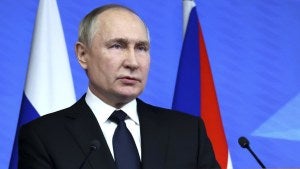 Public Opinion
Public Opinion
The public shares the Kremlin's dim view of Western powers and wants to boost cooperation with BRICS members.
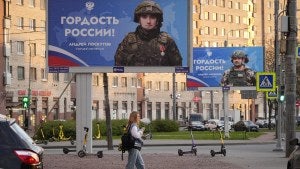 Defense and Security
Defense and Security
Although the public continues to support the military operation in Ukraine, a plurality say it has caused more harm than good for Russia.
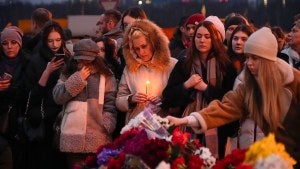 Public Opinion
Public Opinion
Before the Crocus City Hall attack, a plurality of Russian young adults said Russia’s top foreign policy priority should be bolstering the country’s physical defenses.
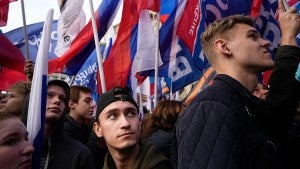 Public Opinion
Public Opinion
Although a plurality of young Russians say they are anxious about Russia’s political future, few vote or participate politically.
